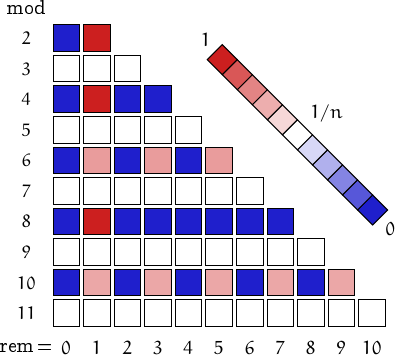The Cullen numbers up to 1015 :
1, 3, 9, 25, 65, 161, 385, 897, 2049, 4609, 10241, 22529, 49153, 106497, 229377, 491521, 1048577, 2228225, 4718593, 9961473, 20971521, 44040193, 92274689, 192937985, 402653185, 838860801, 1744830465, 3623878657, 7516192769, 15569256449, 32212254721, 66571993089, 137438953473, 283467841537, 584115552257, 1202590842881, 2473901162497, 5085241278465, 10445360463873, 21440476741633, 43980465111041, 90159953477633, 184717953466369, 378231999954945, 774056185954305.
Distribution of the remainders when the numbers in this family are divided by n=2, 3,..., 11. (I took into account 100000 values, from 1 to 5⋅1030107).
| n\r | 0 | 1 | |||||||||
|---|---|---|---|---|---|---|---|---|---|---|---|
| 2 | 0 | 100000 | 2 | ||||||||
| 3 | 33334 | 33334 | 33332 | 3 | |||||||
| 4 | 0 | 99999 | 0 | 1 | 4 | ||||||
| 5 | 20000 | 20000 | 20000 | 20000 | 20000 | 5 | |||||
| 6 | 0 | 33334 | 0 | 33334 | 0 | 33332 | 6 | ||||
| 7 | 14286 | 14286 | 14286 | 14286 | 14284 | 14286 | 14286 | 7 | |||
| 8 | 0 | 99999 | 0 | 1 | 0 | 0 | 0 | 0 | 8 | ||
| 9 | 11111 | 11112 | 11111 | 11111 | 11110 | 11110 | 11112 | 11112 | 11111 | 9 | |
| 10 | 0 | 20000 | 0 | 20000 | 0 | 20000 | 0 | 20000 | 0 | 20000 | 10 |
| 11 | 9092 | 9091 | 9090 | 9093 | 9090 | 9090 | 9091 | 9091 | 9090 | 9091 | 9091 |
A pictorial representation of the table above

Imagine to divide the members of this family by a number n and compute the remainders. Should they be uniformly distributed, each remainder from 0 to n-1 would be obtained in about (1/n)-th of the cases. This outcome is represented by a white square. Reddish (resp. bluish) squares represent remainders which appear more (resp. less) frequently than 1/n.
e-mail: info -at- numbersaplenty.com • Privacy notice • engine limits